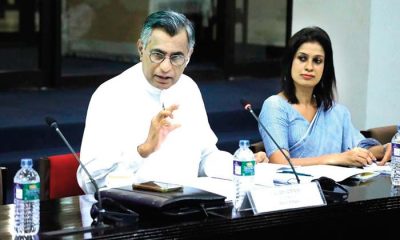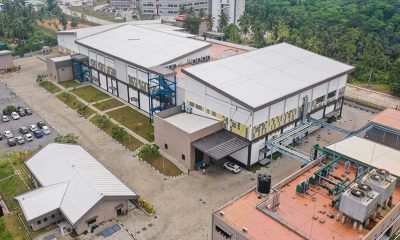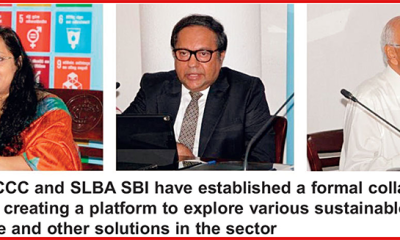Business
Browns Investments PLC makes first investment in Kenya with agreement to purchase James Finlay Kenya

Browns Investments PLC reaches agreement to purchase James Finlay Kenya from FinlaysBrowns will continue to operate James Finlay Kenya as a leading global supplier of Kenyan tea, with a focus on business as usual for employees
Browns and Finlays have mutually agreed to acknowledge the long-standing support of the local community by selling 15% of shares in James Finlay Kenya to a locally owned co-operative Nairobi, Kenya- Browns Investments PLC has today announced that it has reached an agreement with Finlays to purchase its tea estates business James Finlay Kenya.
A highly successful diversified conglomerate and part of the LOLC Holdings PLC group companies, Browns Group is the largest producer of Ceylon tea in Sri Lanka. It owns Maturata Plantations, Hapugastenne Plantations PLC, and Udapussellawa Plantations PLC, and is one of the largest tea producing companies in Sri Lanka consisting of 49 individual estates that stretch across an area of over 30,000 hectares and employs over 10,000 individuals.
The purchase, which will be completed in the next few months, will include all parts of James Finlay Kenya Ltd except the Saosa tea extraction facility. This will remain under Finlays’ ownership and the business will continue to source leaf tea, timber and other services directly from James Finlay Kenya, meaning an uninterrupted service to existing customers. This is Browns’ first investment within Kenya, and it sees the Kenyan tea industry as an exciting, long-term growth opportunity.
While the sale process is concluded, operations for James Finlay Kenya will be business as usual, and a full plan is under development to ensure a smooth transition. On completion of the sale, Browns intends to continue to run the business as it has been operated until now, as a leading global supplier of Kenyan tea, under a new name. There will be no change in the employment arrangements for current employees of James Finlay Kenya.
As part of the sale agreement, Browns and Finlays have mutually agreed to acknowledge the long-standing support of the local community by selling 15% of shares in James Finlay Kenya to a locally owned co-operative. Browns and Finlays have identified a preferred third party which it is currently in discussions with.
Browns Investments PLC was selected by Finlays as the preferred buyer because of its strong legacy of guiding its tea estates to continued growth, but also its focus on doing so sustainably while supporting its workforce and local communities. In December 2021, Browns acquired Finlays’ Sri Lankan tea estates business, which has gone from strength to strength, demonstrating Browns’ successful commitment to sustainable growth.
James Finlay Kenya is Brown’s first investment in the Kenyan tea industry which it sees as an exciting opportunity for growth. Browns also owns a plantation business in Sierra Leone, and James Finlay Kenya will therefore be its second agricultural business in Africa.
Kamantha Amarasekera, Director of Browns Investments PLC said: “We’re proud to be moving a business with such a proud heritage into a new phase of sustainable growth. James Finlay Kenya is an incredible business powered by an incredible community and it has an exciting future. We warmly welcome all members of the James Finlay Kenya team into the Browns family.”
James Woodrow, Group Managing Director of Finlays said: “We undertook a rigorous process when identifying a buyer for the unique business that is James Finlay Kenya prioritising what was best for James Finlay Kenya and its community. Having seen first-hand Browns’ unwavering focus on supporting local people and their communities to thrive when acquiring Finlays Sri Lankan tea estates business in 2021, we have no doubt that Browns is the ideal strategic investor for JFK. We will continue to have a very close relationship with James Finlay Kenya. We look forward to continuing to source tea from James Finlay Kenya and championing Kenyan tea and botanicals across the world.”
Business
President AKD writes to President Trump over trade deficit concerns
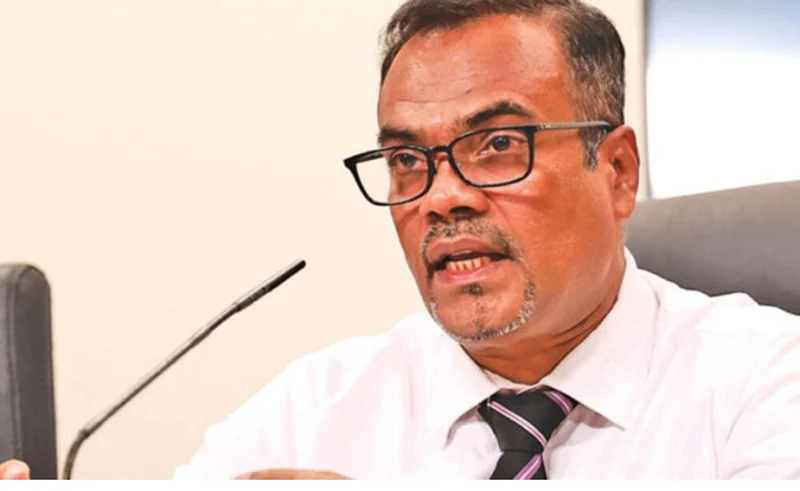
In a bid to address mounting trade tensions, the Sri Lankan government has intensified efforts to reduce its significant trade deficit with the United States, Deputy Minister of Economic Development Dr. Anil Jayantha Fernando announced in parliament yesterday. He added that President Anura Kumara Dissanayake has despatched a formal letter to President Trump urging, among other things, a re-assessment of the recent enhanced tariff regime imposed on Sri Lanka.
The move follows reciprocal tariffs imposed by U.S. President Donald Trump, which Sri Lankan authorities say significantly affect key export sectors. The Deputy Minister indicated that the White House has acknowledged receipt of the Lankan President’s letter, signaling the launching of a potential bilateral dialogue.
Responding to a question raised by New Democratic Front (NDF) MP Ravi Karunanayake, Deputy Minister Fernando revealed that 88% of Sri Lanka’s trade deficit over the past five years stemmed from U.S. trade relations with apparel, rubber products, spices, other agricultural products and precious gems constituting 85% of total exports to the U.S. These exports, he noted, already face tariffs and paratariffs, but President Trump’s recent levies were calculated based on bilateral trade imbalances – a factor that has placed Sri Lanka’s economy under heightened pressure.
“The President’s intervention underscores our commitment to protecting Sri Lankan industries and fostering equitable trade terms, Fernando stated, defending the administration’s proactive and reactive measures to mitigate the US tariffs’ impact on local businesses.
Highlighting ongoing engagement, he added that another round of high-level discussions with the Office of the U.S. Trade Representative (USTR) was scheduled overnight. These talks aim to address structural trade imbalances and explore avenues for tariff relief, particularly for Sri Lanka’s apparel sector, which employs millions nationwide.
The President’s letter marks a strategic move in Sri Lanka’s diplomatic outreach, reflecting the government’s urgency to stabilise an economy still recovering from recent crises while in the middle of an IMF programme.
Sri Lankan industry leaders have cautiously welcomed the government’s efforts but emphasise the need for swift, tangible outcomes.
At present, all eyes remain on Washington’s response to President Dissanayake’s appeal – a potential turning point for Sri Lanka’s trade future, observers noted.
By Sanath Nanayakkare
Business
Inclusive and sustainable apparel for SDGs
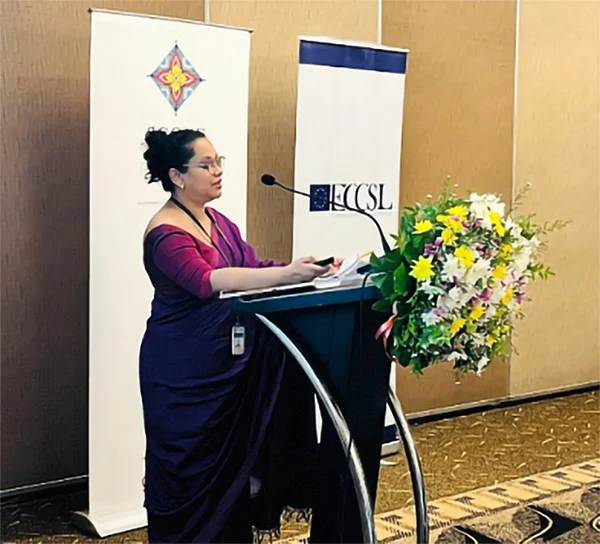
The European Chamber of Commerce of Sri Lanka (ECCSL), in collaboration with the Strengthening Social Cohesion and Peace in Sri Lanka (SCOPE) programme, recently hosted its third industry-focused event, bringing together apparel-sector stakeholders to exchange experiences and practical insights on embedding inclusivity and sustainability into business operations.
Building on the success of ECCSL’s earlier events focused on tourism and food and agriculture, this apparel-focused gathering convened government representatives, industry leaders, business practitioners and the academia to discuss practical strategies for embedding inclusivity and sustainability into business operations.
While many businesses already recognize the importance of these principles, the event emphasized practical implementation, shifting the conversation from the “why” to the “how” of inclusive and sustainable practices.
Chamindry Saparamadu, Director General of the Sustainable Development Council of Sri Lanka, discussed how the Government of Sri Lanka is supporting businesses to create social and environmental impact through its Inclusive and Sustainable Business (ISB) Strategy. Ms. Saparamadu outlined how this strategy aims to create a resilient, equitable, and sustainable economy by building an ecosystem in which inclusive and sustainable businesses can thrive, driving transformative change across industries.
The event also featured engaging presentations from leading apparel businesses—Omega Line, Hirdaramani, and Compreli Consulting—each showcasing real-world examples of how inclusivity and sustainability can be embedded into business operations.
Omega Line, represented by Saman Jayasinghe (Chief HR Officer, Group – Administration) and Charman Dep (Assistant General Manager – Production Planning), presented its multifaceted sustainability approach, spotlighting its Vavuniya factory as a successful model for combining environmental stewardship with social impact.
Hirdaramani’s Manindri Bandaranayake (Chief Brand & Sustainability Officer for Sri Lanka, Bangladesh, Ethiopia, and Vietnam) showcased the company’s holistic sustainability framework, including its Wonders of Wellbeing (WOW) program, policies supporting differently-abled individuals, and deep community engagement.
Finally, Compreli Consulting co-founders Ramesh De Silva and Shehan Olegasageram showcased their innovative garment repair-as-a-service model—a circular, scalable solution that reduces waste and carbon emissions, while aligning with evolving global sustainability regulations.
Participants then had the opportunity to share their own knowledge in a group discussion, exchanging experiences and reflecting on the challenges and opportunities encountered in their sustainability journeys.
The event underscored the collective benefit of building Sri Lanka’s reputation as a global leader in inclusive and sustainable business. By fostering collaboration between businesses, the academic community and government stakeholders, the session aimed to accelerate broader industry adoption of these principles and contribute to Sri Lanka’s sustainable economic growth.
The discussions were facilitated by the Project Lead of ECCSL’s Inclusive Business Practices project, William Baxter.
Business
Union Assurance records Rs. 5.2 Billion PBT, fortifying its financial position by delivering best-in-class value

Union Assurance PLC, Sri Lanka’s longest-standing private Life Insurer, has recorded a strong financial performance with growth across key metrics for the year ending December 31, 2024. The Company achieved a 15% growth in gross written premium, totalling Rs. 21.6 billion driven by double-digit growth in both regular new business premiums and renewal premiums and paid Rs. 7.7 billion worth of claims and benefits to its customers during the year. In addition, for the year ending December 2024, the Company also declared an industry-leading universal life policyholder dividend rate of 12%, underscoring its continued commitment to deliver exceptional value to its customers.
Net investment income recorded a 9% year-on-year growth to reach Rs. 11.8 billion aided by an effective asset allocation strategy. The gains from the trading investment portfolio increased by 123% to reach Rs. 2.9 billion driven by the strong performance of the Colombo Stock Exchange during the latter part of the year.
Union Assurance distributed Rs. 3 billion as surplus from the policyholder fund and reported a profit after tax of Rs. 3.7 billion for 2024. The Company declared a final shareholder dividend of Rs. 5.00 per share amounting to a total payout of Rs. 2.9 billion.
A key milestone for Union Assurance in 2024 was the surpassing of Rs. 100 billion in total assets for the first time in its history, ending the year with Rs. 109.5 billion. This underscores the Company’s solid financial foundation and growth trajectory.
The Company’s assets under management grew by 15% during the year, reaching Rs. 95.6 billion driven by market valuation gains and cash generation from business operations. Furthermore, Union Assurance’s capital adequacy ratio stood at a healthy 264% at the end of 2024, well above the regulatory minimum of 120%.
-

 Business3 days ago
Business3 days agoColombo Coffee wins coveted management awards
-

 Business5 days ago
Business5 days agoDaraz Sri Lanka ushers in the New Year with 4.4 Avurudu Wasi Pro Max – Sri Lanka’s biggest online Avurudu sale
-

 Features4 days ago
Features4 days agoStarlink in the Global South
-

 Business6 days ago
Business6 days agoStrengthening SDG integration into provincial planning and development process
-

 Business5 days ago
Business5 days agoNew SL Sovereign Bonds win foreign investor confidence
-

 Sports7 days ago
Sports7 days agoTo play or not to play is Richmond’s decision
-

 Features4 days ago
Features4 days agoModi’s Sri Lanka Sojourn
-

 Midweek Review12 hours ago
Midweek Review12 hours agoInequality is killing the Middle Class


